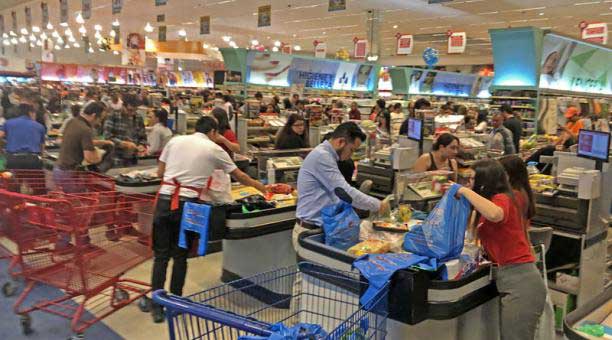According to a report from the Central Bank of Ecuador, between January and March, exports and household consumption contracted.
The 3.3% reduction in imports pushed Ecuador’s economy to grow slightly by 1.2% in the first quarter of 2024 compared to the same period last year, the Central Bank of Ecuador (BCE) explained on Friday, June 28, 2024.
Economic growth was also due to “a positive change in inventories,” the BCE added in a report on the performance of the national economy in the first quarter of the year.
However, it highlighted that the main components of the Gross Domestic Product (GDP) presented year-on-year contractions, especially in the central government expenditure category, which presented an indicator of -0.3%.
Household Consumption Affected
Between January and March of this year, exports contracted by 0.5%, household consumption by 1.1%, and gross fixed capital formation (investments) by 1.3%.
Regarding the reduction in imports, the Central Bank explained that this behavior was due to “a contraction in demand for refined petroleum products, vehicles, and transportation equipment.”
It also noted that “household consumption was affected by the decline in demand for trade and transport services.”
Impact on Shrimp
The reduction in government spending “was based on a decrease in its administrative services,” added the source, emphasizing that the negative behavior of exports was “mainly due to lower sales abroad of processed shrimp.”
The variation in the inventory section contributed positively to GDP “due to a high accumulation of inventories by companies during the first three months of 2024 compared to the same period of the previous year, due to the contractions in domestic and external demand,” added the Central Bank.
At the industry level, only ten of the twenty sectors that make up that section presented a positive performance.
Above all, the electricity and water supply sectors stood out, at 12.5%; fishing and aquaculture, by 10.8%; the exploitation of mines and quarries, by 4.3%; technical professional activities, by 3.9%; and real estate activities, at 2.9%.
Imports Decreased
Compared to the previous quarter (the fourth quarter of 2023), GDP from January to March grew by 3.5%, driven by the recovery of exports by 10.6%; while gross capital accumulation increased by 3.1%, the BCE added.
It also said that the variation in the first quarter of 2024 compared to the last quarter of last year in the area of household consumption improved by 2%, while imports decreased by 10.2%, “contributing positively to the evolution of GDP.”
Additionally, it pointed out that government spending between last January and March decreased by 0.3% compared to the last quarter of 2023, and that a slowdown in the accumulation of company inventories was reported, “contributing negatively to the performance of the GDP.”



0 Comments